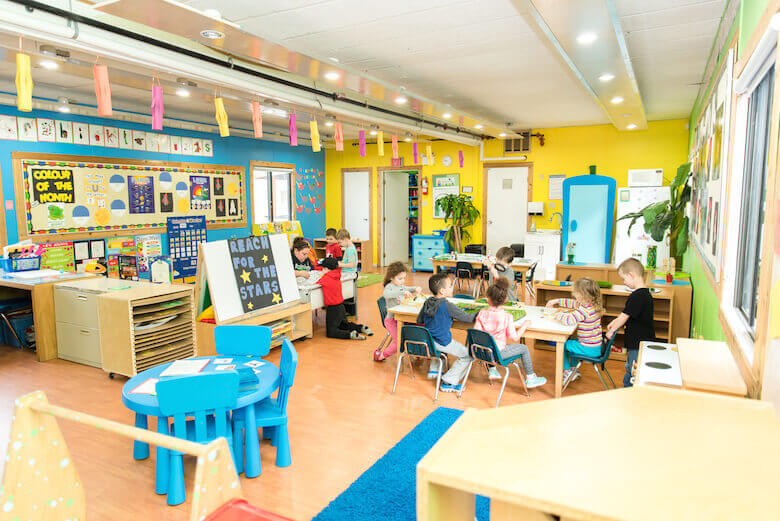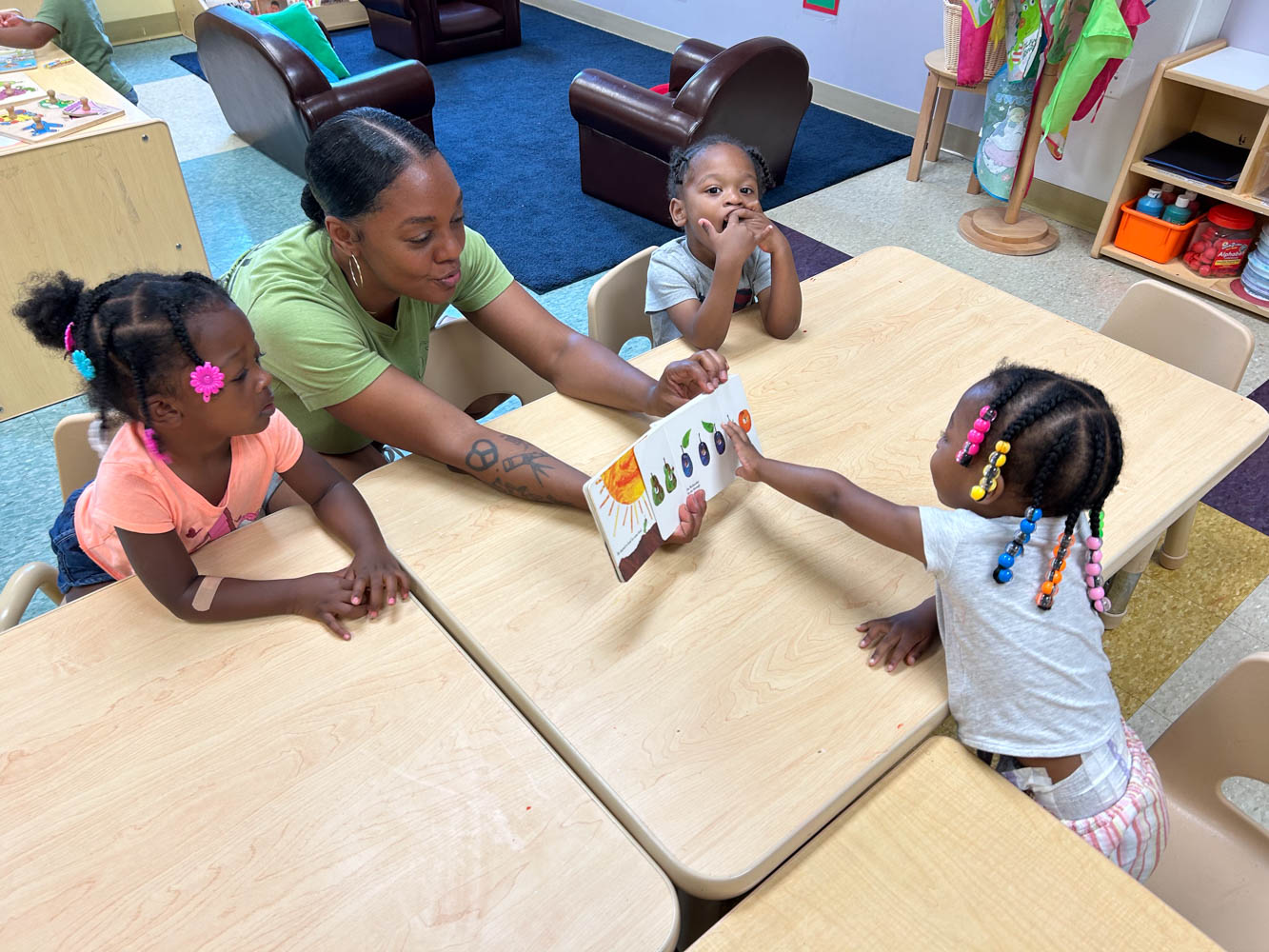The Importance Of Trained Staff In Childcare North York Programs
Discovering the Vital Aspects of a Nurturing Day Care Environment
A nurturing day care setting pivots on a number of critical components. Certified team provide customized focus, while secure centers ensure kids's well-being. Engaging tasks foster growth, and psychological growth is supported through social communications. Reliable interaction with parents enhances cooperation. Furthermore, an inclusive environment, enhanced by diverse social products, promotes respect for differences. The interaction of these components sets the stage for purposeful experiences that shape young lives. What genuinely makes a day care prosper, nevertheless, is frequently found in the refined details.
Qualified and Caring Team
When choosing a daycare, the visibility of certified and caring personnel is important, as these individuals play an important duty in a kid's early growth. Trained specialists with histories in early childhood years education understand the developing turning points youngsters experience and can successfully support their development. Beyond certifications, the psychological knowledge of personnel considerably impacts a child's wellness; caretakers who present compassion and patience produce an encouraging atmosphere for discovering.
A reduced staff-to-child ratio enables for tailored attention, fostering stronger connections between children and caregivers. This connection boosts a child's feeling of protection, which is important for expedition and social interaction. Additionally, continuous training and expert development assurance that team continues to be informed about finest methods, brand-new training techniques, and safety procedures. To summarize, qualified and caring personnel develop the foundation of a nurturing childcare, straight affecting the top quality of care and academic experiences youngsters obtain.
Safe and Safeguard Facilities

Routine inspections and maintenance of the properties are vital to promote standards of security. This consists of checking play tools, guaranteeing correct sanitation, and maintaining a tidy environment to minimize wellness risks. In addition, clear plans regarding emergencies, such as fire drills and emptying procedures, aid prepare both team and children.
Engaging and Developmentally Proper Activities
Involving and developmentally appropriate activities are vital for cultivating development in kids. Play-based learning techniques not only improve cognitive skill advancement however additionally provide important chances for social communication. By integrating these aspects, childcare settings can successfully sustain the holistic development of each child.
Play-Based Discovering Methods
Play-based learning strategies are crucial for fostering children's development in a nurturing day care atmosphere. These methods urge expedition and creative thinking, enabling youngsters to take part in tasks that mirror their rate of interests and interests. Child Care Center. With imaginative play, children create social skills, learn to cooperate, and technique analytic. Integrating varied products and play settings, such as art supplies, structure blocks, and role-playing areas, assurances that tasks continue to be developmentally proper and appealing. Additionally, caretakers can help with play by giving support and support, aiding children browse their experiences while advertising independence. This method not only supports social and emotional development but additionally lays a foundation for long-lasting discovering, making play a vital component of very early childhood education in childcare setups
Cognitive Skill Advancement
Fostering cognitive skill growth in kids can be effortlessly integrated with play-based knowing strategies. Engaging and developmentally proper activities, such as challenges, foundation, and interactive storytelling, promote essential thinking and analytic capabilities. These activities motivate exploration and trial and error, allowing youngsters to develop and make connections thinking abilities. Furthermore, including sensory experiences, like arts and crafts or nature walks, improves cognitive involvement by appealing to various discovering designs. By advertising inquisitiveness and creativity, caregivers produce a setting that supports cognitive growth. Examining youngsters's progress through observation warranties that tasks stay lined up with private developing stages, promoting an individualized approach to understanding. Ultimately, a well-rounded curriculum that prioritizes cognitive skill development lays a solid structure for long-lasting understanding.
Social Communication Opportunities
While kids naturally seek interaction with their peers, providing structured social interaction possibilities boosts their capability to connect and team up. Involving tasks such as team games, cooperative art projects, and narration sessions urge youngsters to share concepts and settle conflicts. These experiences are important for developing social skills, including empathy and active listening. Additionally, incorporating play-based learning fosters creative thinking and builds teamwork amongst kids. Caregivers can facilitate these interactions by creating a comprehensive setting that values each kid's payments and point of views. Frequently rotating tasks keeps the engagement degree high, enabling kids to discover various social dynamics. Inevitably, a focus on social communication not only enriches youngsters's experiences however also sustains their general emotional and social development.
Focus on Social Interaction and Emotional Development
Developing a supporting day care environment greatly enhances youngsters's social interaction and psychological development. In such setups, caretakers give structured tasks that motivate youngsters to engage with each other, cultivating team effort and cooperation. These interactions help kids create crucial social skills, such as sharing, empathy, and problem resolution.
Additionally, a supporting atmosphere allows kids to share their emotions openly. Caretakers play a significant function in modeling psychological knowledge, leading children to recognize and articulate their feelings. This assistance improves youngsters's capacity to navigate their emotional landscapes, resulting in enhanced self-regulation and durability.
In addition, via team play and joint jobs, kids discover to appreciate variety and establish relationships. These experiences not only strengthen social bonds but also contribute to a sense of belonging, crucial for emotional well-being. Prioritizing social communication and psychological advancement within day care settings lays a solid structure for youngsters's future partnerships and mental wellness.
Open Up Communication With Parents
Just how can open interaction with parents enhance the childcare experience for children? Developing a transparent discussion in between day care personnel and parents promotes a joint setting that benefits every person included. They are a lot more most likely to involve favorably in their youngster's growth when moms and dads feel educated concerning their kid's everyday tasks and development. This partnership permits caregivers to tailor experiences that straighten with each child's familial expectations and special needs.
Routine updates, responses sessions, and open-door policies can aid build count on and connection in between caretakers and moms and dads. Furthermore, when parents share understandings regarding their youngster's behavior and preferences, it makes it possible for day care team to create more tailored and nurturing experiences. This exchange not only boosts the youngster's comfort and safety yet also advertises a feeling of belonging within the childcare community. Eventually, open interaction cultivates an atmosphere where kids can prosper emotionally, socially, and developmentally.
Inclusive and Diverse Environment
A inclusive and diverse setting in childcare setups promotes a feeling of belonging among kids from different backgrounds. By commemorating social distinctions and giving accessible discovering products, instructors can develop improving experiences that reflect the diversity of their community. Additionally, motivating peer communication assists kids gain from one an additional, promoting empathy and understanding.
Celebrating Social Differences
Why is it vital for day care environments to commemorate social differences? Identifying and recognizing different cultures cultivates a comprehensive environment where every child really feels valued. Commemorating cultural distinctions assists children create regard and recognition for variety from a young age. Via activities like multicultural events, storytelling, and art jobs, youngsters gain understandings into practices, practices, and languages various from their own. This direct exposure advertises empathy and decreases bias, preparing them for a global culture. When caregivers integrate aspects from diverse societies into day-to-day regimens, it nurtures a feeling of belonging amongst children, strengthening their identification. Inevitably, celebrating social distinctions enriches the discovering setting, adding to holistic development and social cohesion among young learners.
Obtainable Discovering Materials
Easily accessible understanding materials are necessary in developing a inclusive and diverse setting within day care setups. These products should reflect a variety of cultures, languages, and experiences, making sure that every child really feels stood for and valued. This can consist of publications including varied personalities, playthings that advertise numerous social practices, and academic sources that address different discovering designs. By supplying a selection of obtainable products, caretakers can sustain children's private needs and interests, fostering a sense of belonging. Furthermore, such resources motivate objectivity and respect for differences, allowing youngsters to discover the globe around them. Ultimately, available knowing products function as critical tools for nurturing inquisitiveness, compassion, and understanding amongst young students in childcare settings.
Urging Peer Communication
While cultivating a nurturing childcare environment, motivating peer communication plays a crucial function in promoting inclusivity and variety. By supplying opportunities for youngsters to participate in joint tasks, teachers can create an ambience where every child really feels valued and included. Structured play and team jobs can enhance social abilities and empathy, permitting kids to pick up from each other's perspectives and histories. Diverse materials and playthings that reflect different cultures additionally support this goal, aiding kids to value differences. In addition, promoting open interaction among peers motivates the sharing of concepts and experiences, which can enhance relationships. Ultimately, an emphasis on peer interaction cultivates a feeling of belonging, enabling children to grow in a diverse and comprehensive environment.
Concentrate on Wellness and Nutrition
Making certain a robust concentrate on wellness and nourishment is crucial for fostering a supporting day care atmosphere, as it lays the structure for children's growth and advancement. A well-structured dish strategy that includes a range of fruits, veggies, entire grains, and proteins not just supports physical health however additionally boosts cognitive function. Educators can encourage healthy eating practices by including youngsters in dish prep work and discussions about nutrition.
Furthermore, regular exercise is crucial; including playtime and organized workouts aids create electric motor abilities and advertises general wellness. Childcares need to additionally focus on hygiene practices, such as proper handwashing and sanitation in food preparation areas, to avoid health problem.
Regularly Asked Inquiries
What Is the Childcare's Plan on Display Time for Kid?

The day care's policy on screen time for youngsters restrictions usage to educational purposes, permitting a maximum of thirty minutes daily (Daycare North York). This method encourages exercise and social interaction, advertising overall growth and health in little ones
How Is Self-control Managed in the Daycare Environment?
Technique in the day care environment is handled through favorable reinforcement, clear interaction, and age-appropriate repercussions. Personnel focus on training children about appropriate behavior while promoting understanding and empathy among peers to advertise a harmonious ambience.
Are Meals and Snacks Prepared On-Site or Delivered?

Do You Deal Versatile Setting Up for Moms And Dads?
Yes, the center provides flexible scheduling options for parents, accommodating various work hours and family needs. This adaptability guarantees that caregivers can balance their responsibilities while guaranteeing children get high quality treatment and attention throughout the day.
What Is the Caregiver-To-Child Proportion in the Day care?
The caregiver-to-child proportion in the childcare is usually one caregiver for every single four infants, one for every single six toddlers, and one for every single ten young children. This guarantees ample interest and assistance for every youngster's developmental demands.
Play-based knowing approaches are vital for fostering youngsters's development in a nurturing daycare setting. Producing a nurturing childcare environment substantially enhances kids's social interaction and psychological growth. When parents really feel informed concerning their child's everyday tasks and progress, they are a lot more likely to engage favorably in their child's advancement. By giving opportunities for youngsters to involve in collective activities, teachers can develop an atmosphere where every kid feels valued and included. Making sure a durable emphasis on health and nutrition is crucial for fostering a supporting day care environment, as it lays the structure for youngsters's development and development.